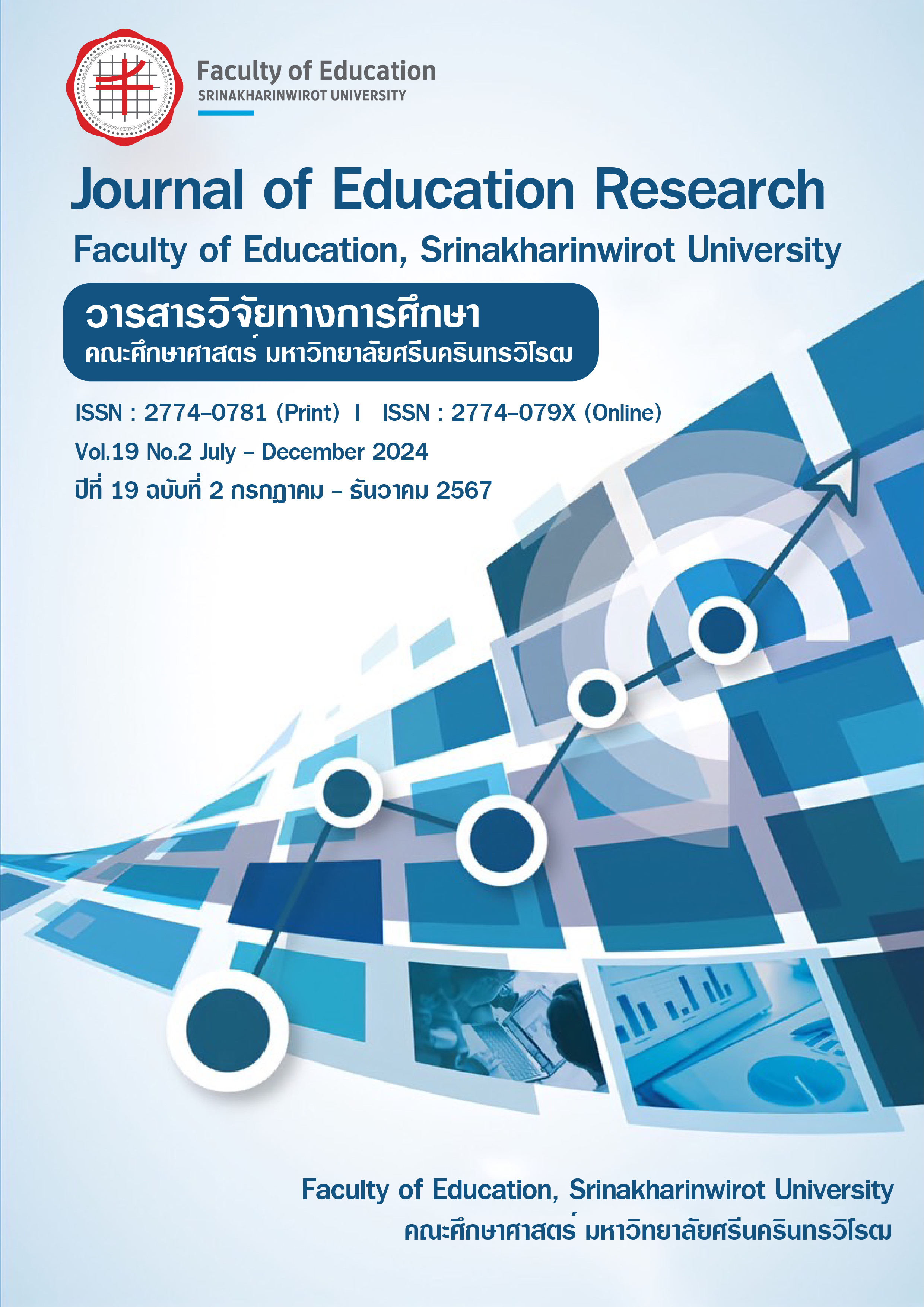DEVELOPING AN ONLINE MATHEMATICS CURRICULUM USING THE 3T FRAMEWORK AND ACTIVE LEARNING FOR ELEMENTARY SCHOOL STUDENTS OF BANGKOK DEPARTMENT OF EDUCATION
Keywords:
Online Curriculum, 3T framework, MathematicsAbstract
This research aims to 1) study the context, problems, and needs for an online mathematics curriculum in small schools under the jurisdiction of Bangkok, and 2) develop an online mathematics curriculum. The target groups for studying the context and needs of the schools include: 10 administrators and teachers, 3 lecturers, 5 students, and 3 experts. Th e tools used in th e research include 1) a survey on problems and needs, and 2) an evaluation form for the efficiency of th e curriculum for experts. Research Results: 1. The context of the schools shows a shortage of personnel, particularly mathematics teachers. However, the schools are well-equipped with infrastructure and information technology systems, and teachers can use online teaching materials and curricula. Th e issues identified include students lacking equipment for online learning and a lack of interest in learning, indicating a need for high-quality online curricula that align with the context, featuring a blended approach. 2. The onlin e mathematics curriculum incorporates activities using The 3T Framework alongside active learning methods. Th e curriculum spans 30hours, including 12 hours of synchronous learning led by teachers and 18 hours of asynchronous learning, where students learn independently through websites and online platforms. The content focuses on Ratios, with learning materials including websites, videos, interactive multimedia, educational games, and exercises developed using Canva, Zoom, YouTube, and Scratch. The curriculum's effectiveness evaluation shows relevance in both content and technology, with the overall evaluation indicating a high level of appropriateness.
References
ชลธิชา พิมพ์ทอง. (2566). การพัฒนารูปแบบการจัดการเรียนการสอนโดยใช้กระบวนการบริบทท้องถิ่นเป็นฐาน Local Context Based Learning : LBL เพื่อส่งเสริมความสามารถ ด้านการอ่านและการเขียนภาษาอังกฤษระดับชั้นมัธยมศึกษาปีที่ 1. Journal of Roi Kaensarn Academi. 8(1),108-119.
นันท์นลิน สีแก่นวงศ์ และ อาภรณ์ สอาดเอี่ยม. (2566). การวิเคราะห์องค์ประกอบของปัจจัยในการเรียนออนไลน์สำหรับนักเรียนระดับประถมศึกษา. วารสารวิชาการศึกษาศาสตร์ ศรีนครินทรวิโรฒ. 24(2), 32 – 48.
รัตนาภรณ์ พินิจนึก. (2565). การบริหารจัดการการเรียนการสอน ภายใต้สถานการณ์ COVID – 19 วารสารวิจัยศรีล้านช้าง. 2(7), 53-61.
วุฒิชัย ภูดี. (2563). การสอนคณิตศาสตร์ในยุคดิจิทัล: วิธีการและเครื่องมือ. วารสารวิทยาศาสตร์และวิทยาศาสตร์ศึกษา, 3(2), 190-199.
สินชัย จันทร์เสม และ เอมมิกา วชิระวินท์ . (2564). การใช้กิจกรรมเสริมคณิตศาสตร์แบบเชื่อมโยงบริบทเพื่อพัฒนาความสามารถในการแก้ปัญหาคณิตศาสตร์และเจตคติต่อวิชาคณิตศาสตร์ของนักเรียนระดับประถมศึกษาตอนปลาย .วารสารวิจัยทางการศึกษา คณะศึกษาศาสตร์ มหาวิทยาลัยศรีนครินทรวิโรฒ, 16(1), น. 99-111.
สิริพร ทิพย์คง. (2544). การแก้ปัญหาคณิตศาสตร์ (Problem Solving). กรุงเทพฯ : คุรุสภา ลาดพร้าว.
อัญญาณี สุมน. (2560). สรุปผลการวิจัยโครงการพัฒนานวัตกรรมการเรียนการสอนทางคณิตศาสตร์ โดยการประยุกต์ใช้เทคโนโลยีดิจิทัลเพื่อการเรียนรู้เชิงรุกของนักเรียนชั้นมัธยมศึกษาปีที่ 3 โรงเรียนพระแสงวิทยา. สุราษฎร์ธานี: โรงเรียนพระแสงวิทยา. สืบค้นจาก https://ojs.lib.buu.ac.th/index.php/social/article/download/5114/2289/4921
เอมมิกา วชิระวินท์ และ สินชัย จันทร์เสม .(2563). ผลการใช้สื่อการเรียนรู้ออนไลน์เพื่อพัฒนาผลสัมฤทธิ์ทางการเรียนรายวิชาวิทยาการคำนวณของนักเรียนระดับประถมศึกษาสำหรับโรงเรียนขนาดเล็กสังกัดกรุงเทพมหานคร. วารสารวิจัยทางการศึกษา คณะศึกษาศาสตร์ มหาวิทยาลัยศรีนครินทรวิโรฒ. 15(1), 70-84.
Hart T.L. (2024). Supporting Elementary Teachers with Technology Integration within the Mathematics Curriculum (Doctoral dissertation). Walden University. MN. USA.
Krejcie, R.V., & D.W. Morgan. (1970). “Determining Sample Size for Research Activities”. Educational and Psychological Measurement. 30(3), 607 – 610.
Magana, Sonny. (2017). Disruptive Classroom Technologies. USA: Corwin.
Puarungroj, W., Pongpatrakant, P. & Phromkhot, S. (2017). Trends in modern teaching and learning methods using online formative assessment tools. Journal of Learning Innovations Walailak University. 3(2), 45-68.
Downloads
Published
How to Cite
Issue
Section
License

This work is licensed under a Creative Commons Attribution-NonCommercial-NoDerivatives 4.0 International License.



